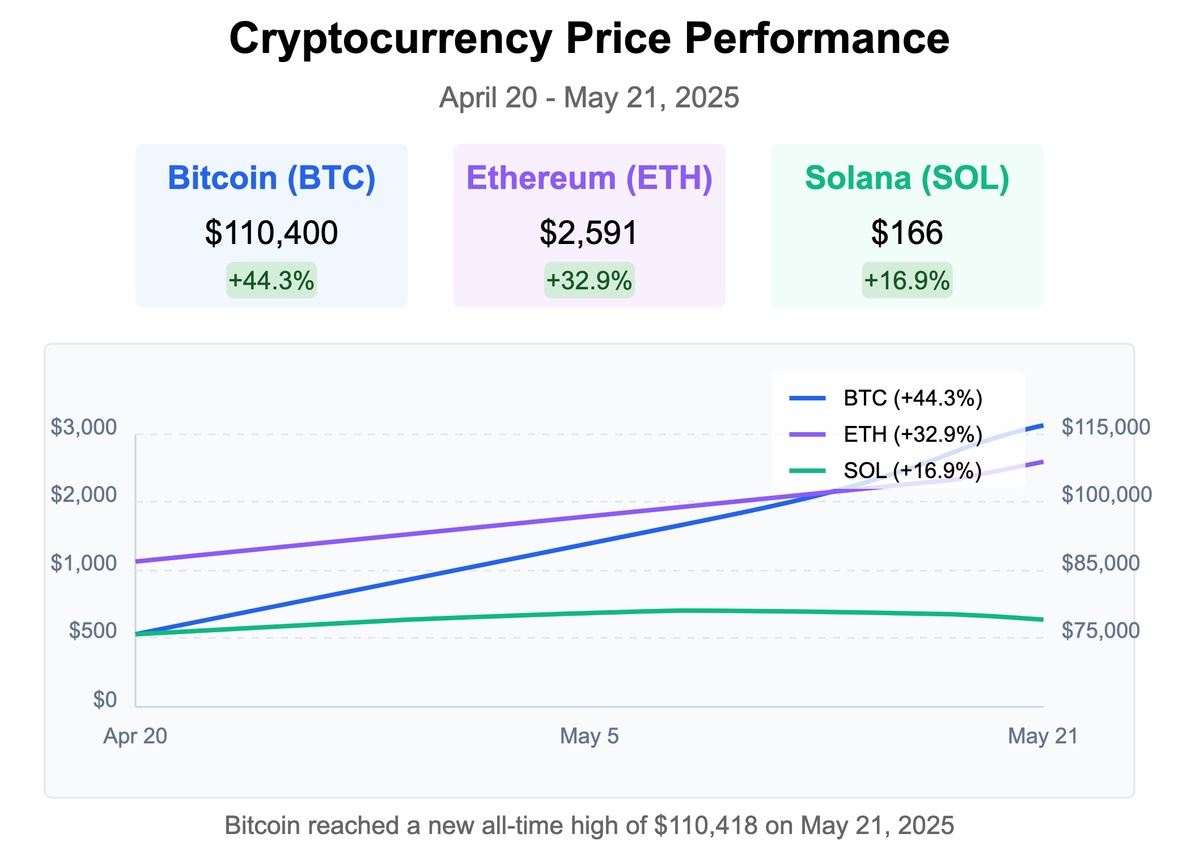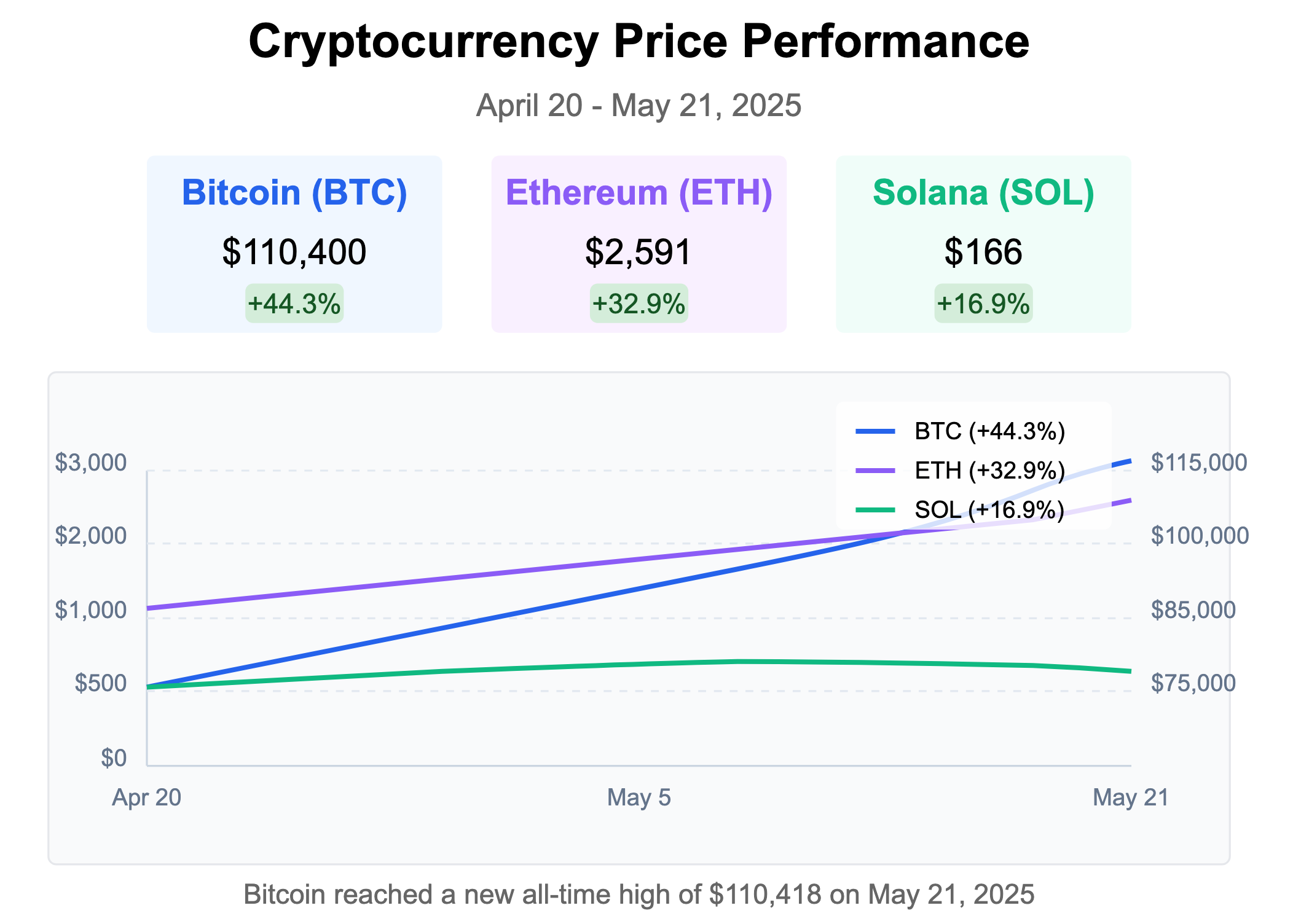Crypto is Ripping while the Dollar is Slipping
As cryptocurrency markets surge to new heights, a sobering fiscal reality emerges in Washington

The recent surge in cryptocurrency prices isn't just about technological innovation or market speculation—it's increasingly a referendum on fiscal governance. As Bitcoin crosses $110,000, with Ethereum and selected alternatives following in its wake, we're witnessing a flight to what many now consider digital monetary shelter.

The "Big Beautiful Bill" and the Deficit Illusion
The administration's much-touted "Big Beautiful Bill" was marketed as a deficit-reduction measure. The reality playing out Washington is much different, and markets aren't buying the administration’s narrative. Bond yields continue inexorably creeping upward, and the dollar is showing signs of strain against a basket of foreign currencies, and newer crypto alternatives.
Of course, the Department of Government Efficiency (DOGE) was announced with great fanfare as this administration’s solution to bloated bureaucracy and wasteful spending. Yet beyond targeting a few "woke" targets of social conservatives, precious little progress has been made toward meaningful fiscal restraint.
When Elon Musk first unveiled his DOGE chainsaw, he promised savings of $1-2 trillion. The reality? According to recent analyses, DOGE has delivered just $16-37 billion in actual savings—less than 0.25% of the federal budget and a mere fraction of those initial targets. Meanwhile, the Congressional Budget Office projects that the "Big Beautiful Bill" will increase the deficit by $3.8 trillion over the next decade, with independent analyses suggesting the total could reach $5.3 trillion if temporary tax cuts are extended.
DOGE is - or was - political theater, not structural reform—targeting headlines rather than balance sheets. Adding insult to injury, the Partnership for Public Service estimates DOGE's disruptive actions will actually cost taxpayers $135 billion in productivity losses and administrative expenses.
In other words, DOGE didn’t - and won’t - save the day. It may not even pay for itself.
The Relative Advantage is Eroding
For decades, the U.S. government's inability to balance its budget was countered by a simple reality: most other major economies were similarly undisciplined. Exchange rates are relative measures - if every major currency is being devalued through deficit spending, the effects partially cancel each other out. The US government has been enabled by equally irresponsible governments in most major countries.
Crypto changes the game. Bitcoin's supply schedule is transparent and unchangeable. Ethereum's monetary policy, post-merge, has made it close to deflationary. These aren't just technical details—they're governance mechanisms that create predictability - and that aren’t dependent on politicians to enforce.
While traders cite various catalysts—ETF flows, institutional adoption, technological upgrades—the underlying theme is consistent: a growing preference for assets with predictable supply schedules over those controlled by increasingly undisciplined politicians and fiscal authorities.
A Fiscal Awakening?
Could this trend force a fiscal awakening in Washington? History suggests exactly the opposite.
Political incentives remain stacked against fiscal discipline. The rewards for spending are immediate and concentrated, while the costs are delayed and diffuse. This asymmetry creates a structural bias toward deficit spending that transcends party lines.
What's different now is that markets have alternatives. When citizens and investors lose confidence in a currency's long-term prospects, they traditionally had limited options—perhaps gold or foreign currencies with their own problems.
Cryptocurrency represents something new: programmatic monetary policy resistant to political tampering.
The Path Forward
For investors, the implications are profound. The traditional 60/40 portfolio may need rethinking in an era where government bonds represent exposure to increasingly questionable fiscal policies. A small allocation to deflationary digital assets serves not just as a speculation but as a hedge against fiscal mismanagement.
For policymakers, the message should be sobering. The market is rendering its verdict on fiscal policy in real-time, and the judgment isn't favorable. Each percentage point of Bitcoin's rise represents, in part, eroding confidence in traditional monetary stewardship.
The solutions aren't mysterious—they're just politically difficult:
- Realistic accounting for entitlement liabilities such as Medicaid and Social Security - “third rails” that the government has thus far been unwilling to touch
- Tax policies that actually generate projected revenues - which means taxing everyone, not just “the rich”
- Spending discipline across both mandatory and discretionary categories
- Long-term structural reforms to major programs
The cryptocurrency surge isn't causing these fiscal problems, but it is making them harder - arguably impossible - to ignore. In a world where citizens can opt into alternative monetary systems with a few clicks, the consequences of political fiscal mismanagement become more immediate and more severe.
The question isn't whether we need fiscal discipline—it's whether we'll choose it ourselves or have it forced upon us by markets that have already begun voting with their wallets.




